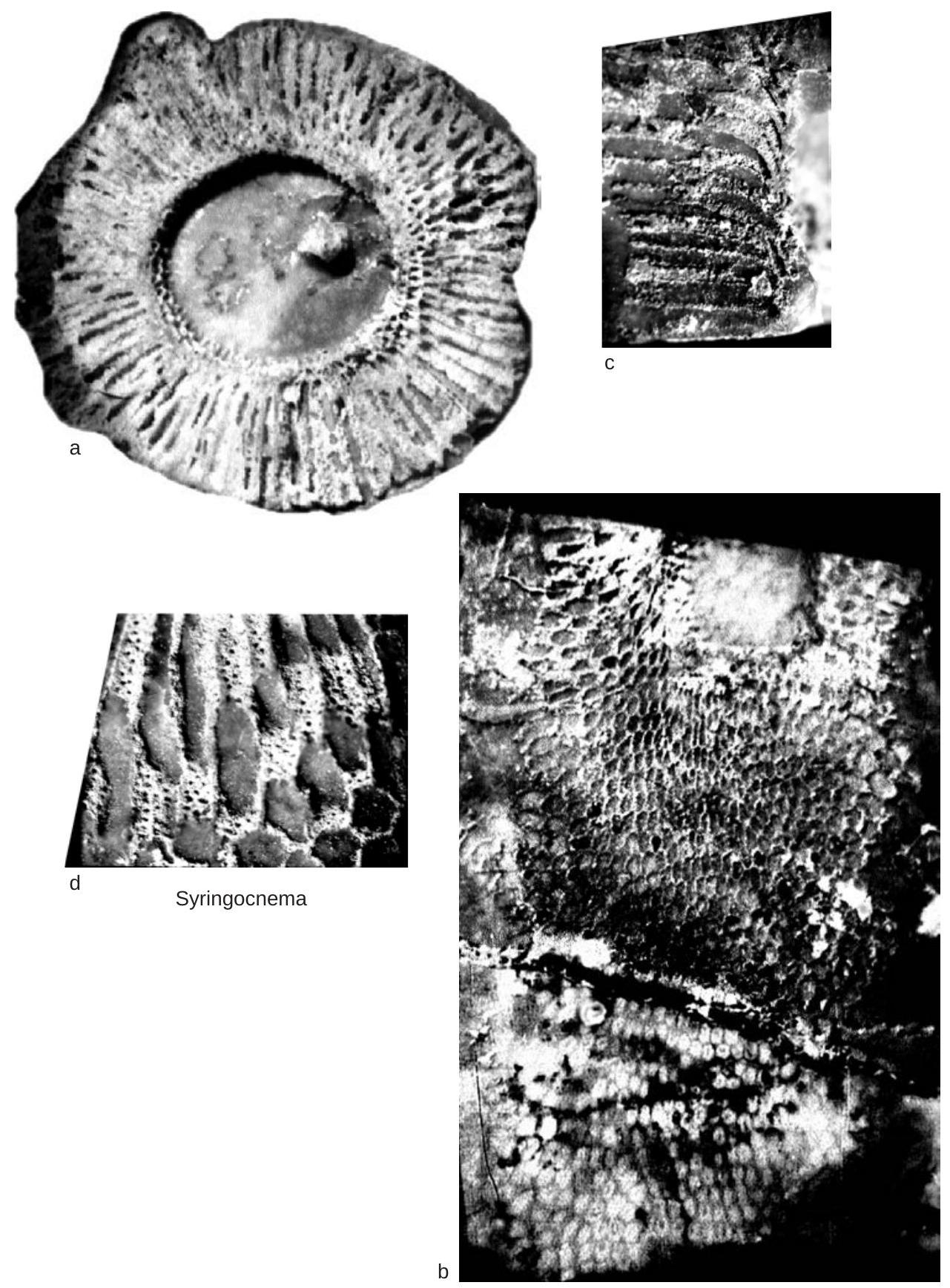Welcome to the Treatise on Invertebrate Paleontology!
Please enter a genera name to retrieve more information.

Syringocnema
Classification
Phylum:
Porifera
Class:
Archaeocyatha
Order:
Archaeocyathida
Suborder:
Syringocnemina
Superfamily:
Syringocnemoidea
Family:
Syringocnemidae
Formal Genus Name and Reference:
Syringocnema TAYLOR, 1910, p. 153
Type Species:
S. favus, M, holotype, Taylor, 1910, pl. 14, photos 78-79, M, SAM T1597A, B, E, Adelaide
Images
(Click to enlarge in a new window)
Fig. 652a-d. *S. favus, Ajax Limestone, Botoman, Ajax Mine, South Australia, Australia, a-c, holotype, SAM T1597A, B, E, a, transverse view, x3, b, oblique longitudinal view, X3.5, c, detail of syringes in longitudinal view (outer wall to left), X5; d, paratype, SAM T1558, detail of syringes in oblique transverse view, X5 (Debrenne, Zhuravlev, & Kruse, 2002).
Synonyms
Geographic Distribution
Australia, Antarctica, ?Falkland Islands (allochthonous)
Age Range
Beginning Stage in Treatise Usage:
lower Cambrian (Botomian 3)
Beginning International Stage:
Cambrian Stage 4
Fraction Up In Beginning Stage:
0
Beginning Date:
514.5
Ending Stage in Treatise Usage:
lower Cambrian (Botomian 3)
Ending International Stage:
Cambrian Stage 4
Fraction Up In Ending Stage:
25
Ending Date:
513.13
Description
Inner wall with one row of pores per syrinx, bearing upwardly projecting, S-shaped pore tubes, syringes hexagonal in cross section with several pore rows per facet
References
Taylor, T. G. 1910. The Archaeocyathinae from the Cambrian of South Australia with an account of the morphology and affinities of the whole class. Royal Society of South Australia, Memoirs 2:55-188, 51 fig., 16 pl., chart.
Museum or Author Information
Classification
Phylum:
Porifera
Class:
Archaeocyatha
Order:
Archaeocyathida
Suborder:
Syringocnemina
Superfamily:
Syringocnemoidea
Family:
Syringocnemidae
Formal Genus Name and Reference:
Syringocnema TAYLOR, 1910, p. 153
Type Species:
S. favus, M, holotype, Taylor, 1910, pl. 14, photos 78-79, M, SAM T1597A, B, E, Adelaide
Images
(Click to enlarge in a new window)
Fig. 652a-d. *S. favus, Ajax Limestone, Botoman, Ajax Mine, South Australia, Australia, a-c, holotype, SAM T1597A, B, E, a, transverse view, x3, b, oblique longitudinal view, X3.5, c, detail of syringes in longitudinal view (outer wall to left), X5; d, paratype, SAM T1558, detail of syringes in oblique transverse view, X5 (Debrenne, Zhuravlev, & Kruse, 2002).
Synonyms
Geographic Distribution
Australia, Antarctica, ?Falkland Islands (allochthonous)
Age Range
Beginning Stage in Treatise Usage:
lower Cambrian (Botomian 3)
Beginning International Stage:
Cambrian Stage 4
Fraction Up In Beginning Stage:
0
Beginning Date:
514.5
Ending Stage in Treatise Usage:
lower Cambrian (Botomian 3)
Ending International Stage:
Cambrian Stage 4
Fraction Up In Ending Stage:
25
Ending Date:
513.13
Description
Inner wall with one row of pores per syrinx, bearing upwardly projecting, S-shaped pore tubes, syringes hexagonal in cross section with several pore rows per facet
References
Taylor, T. G. 1910. The Archaeocyathinae from the Cambrian of South Australia with an account of the morphology and affinities of the whole class. Royal Society of South Australia, Memoirs 2:55-188, 51 fig., 16 pl., chart.
